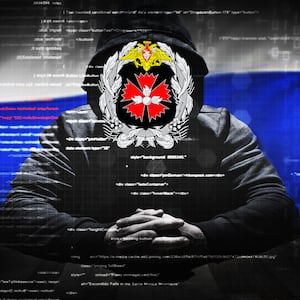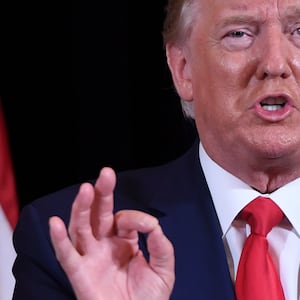President Donald Trump’s obsession with obtaining emails hacked from the Democratic National Committee’s servers in 2016 was a topic of near-constant conversation at the highest levels of his campaign, a massive tranche of documents relating to the special counsel investigation reveals.
The documents, the result of a pair Freedom of Information Act lawsuits filed by BuzzFeed News and CNN, show that the Trump campaign was “very happy” with the public release of the emails, the hacking of which was eventually traced by the U.S. intelligence community to the Kremlin.
But even as early as 2016, a top Trump aide placed the blame for the hack on Ukraine—echoing the same conspiracy theory recently revived by Trump and his personal attorney, Rudy Giuliani, to justify their pressure campaign on that country’s leaders.
According to notes from an April 2018 interview with Rick Gates, a former deputy chair of Trump’s campaign, then-Trump campaign chairman Paul Manafort was insistent in 2016 that Ukraine—rather than Russia—was behind the hacking of the DNC servers, a baseless accusation that Trump has recently used to apparently explain away his request for Ukrainian authorities to investigate the 2016 election and his political opponents.
That request, captured in a July 25 phone call with Ukrainian President Volodymyr Zelensky in which Trump reminds the new Ukrainian leader of America’s generosity before asking for a “favor,” is currently at the center of an ongoing impeachment inquiry.
According to Gates, Manafort said that the hacking was “likely carried out by the Ukrainians, not the Russians,” a theory also advocated by Manafort associate Konstantin Kilimnik, as well as Flynn, whom Gates described as “adamant” that Russia was not involved in the hacking.
The newly released documents suggest that the Trump campaign embraced the release of the stolen emails. At times, members of the Trump campaign were so impatient waiting for the potential release of more emails that they floated names of potential staffers who could be tasked with pursuing them personally.
“[Michael] Flynn said he could use his intelligence sources to obtain the emails,” investigators wrote after interviewing Gates, who said that Flynn “had the most Russia contacts of anyone on the campaign,” and was therefore “in the best position to ask for the emails if they were out there.”
Gates also recalled an instance on the Trump campaign airplane when Trump urged his staffers to “get the emails,” and name checked a veritable who’s who of Trumpworld figures who had expressed an interest in obtaining the emails, ranging from campaign staffers Paul Manafort, Corey Lewandowski, and Sam Clovis to members of Trump’s own family, including Donald Trump, Jr. and Jared Kushner.
Jeff Sessions, who would eventually serve as Trump’s long-suffering attorney general and who would eventually be forced to recuse himself from overseeing the Russia investigation, “expressed interest in obtaining the emails as well,” according to investigators’ notes.
“Trump was frustrated the releases weren’t happening,” according to investigators’ notes after interviewing Gates.
The 274-page, partially redacted cache of documents—part of a motherlode of interview summaries, memos, emails, transcripts, and legal opinions generated by Robert Mueller’s investigation into potential links between the Trump campaign and attempts by the Russian government to interfere with the 2016 presidential election—is the first installment of dozens set to be released by the Justice Department over the next eight years in response to a court order.
The first installment is composed of summaries of interviews with key figures within Trump’s campaign and presidential administration, including former White House adviser Stephen Bannon, former Trump Organization attorney and convicted felon Michael Cohen, Gates, and others.
The interview summaries provide an unvarnished look at the inner workings of the Trump campaign, which was almost singularly fixated on the DNC email hackings—and how best to exploit them for Trump’s political gain.
According to the interview summary of investigators’ conversation with Gates, the campaign viewed the hacked emails as, at a minimum, as a “mode of deflection” after Trump accused former opponent Sen. Ted Cruz’s father of potential involvement with the assassination of President John F. Kennedy.
Following the release of some of the emails by Wikileaks, Gates said, Manafort and another redacted person “were happy from a communications team perspective” for the distraction from Trump’s comments that Cruz “never denied” that his father was pictured by the National Enquirer at breakfast with Lee Harvey Oswald three months before the president’s murder.
Gates also noted that he anticipated additional leaks to come after Trump himself said that “more leaks were coming.”
Trump wasn’t the only one who claimed to have advanced knowledge of coming email leaks. Gates told federal investigators that the Republican National Committee, too, indicated that they knew the timing of future email drops. “Gates did not specify who at the RNC knew this information,” the interview notes say. “Gates said the only non-public information the RNC had was related to the timing of the release.”
Gates also told investigations that Manafort told him to “periodically call” a certain someone to “ check in on where the information was and when it would be coming,” though that person’s name has been redacted in the released documents.
In 2018, Gates pleaded guilty to conspiracy against the United States and to making false statements to investigators, part of a plea bargain that required full cooperation with Mueller’s investigation. He has not yet been sentenced.
Trump’s conspiracism extended to the Russia investigation itself, according to interview notes from a sit-down investigators conducted with Bannon. In the interview, Bannon told investigators that Trump had told him about “issues” involving Mueller and Trump’s golf course in Virginia, which Trump later suggested were an indicator of anti-Trump bias by the man at the head of the investigation into his campaign’s connections to the Kremlin.
Manafort—who is currently serving an eight-year prison sentence on charges of tax fraud, bank fraud, failure to disclose foreign bank accounts, and conspiracy—is also revealed in the documents to have been advising the Trump campaign long after he left his position as campaign chair following questions about his connections to former Ukrainian President Viktor Yanukovych and other pro-Russian Ukrainian politicians.
Manafort was fired, according to Bannon’s interview with the FBI, after Kushner and wife Ivanka Trump were recalled from a vacation off the coast of Croatia with a Russian billionaire to do so. Bannon told investigators that friends in the intelligence community had called the Russian billionaire’s girlfriend, who was on the vacation, “questionable.”
According to an email to Kushner three days before Election Day, Manafort wrote that he was feeling “really good about our prospects on Tuesday,” and that he had sent Kushner and RNC chair Reince Priebus a memo on “preserving the victory” in the election. According to the email, he had also briefed Gates and Fox News host Sean Hannity, a figure who appeared in the Trump campaign offices “often,” according to Gates’ interviews.
In response, Bannon told Kushner that the campaign needed to avoid Manafort “like the plague.”
“Paul is nice guy but can’t let word get out he is advising us,” Bannon wrote. “They are going to try to say the Russians worked with wiki leaks to give this victory to us.”
—with additional reporting by Kelly Weill







